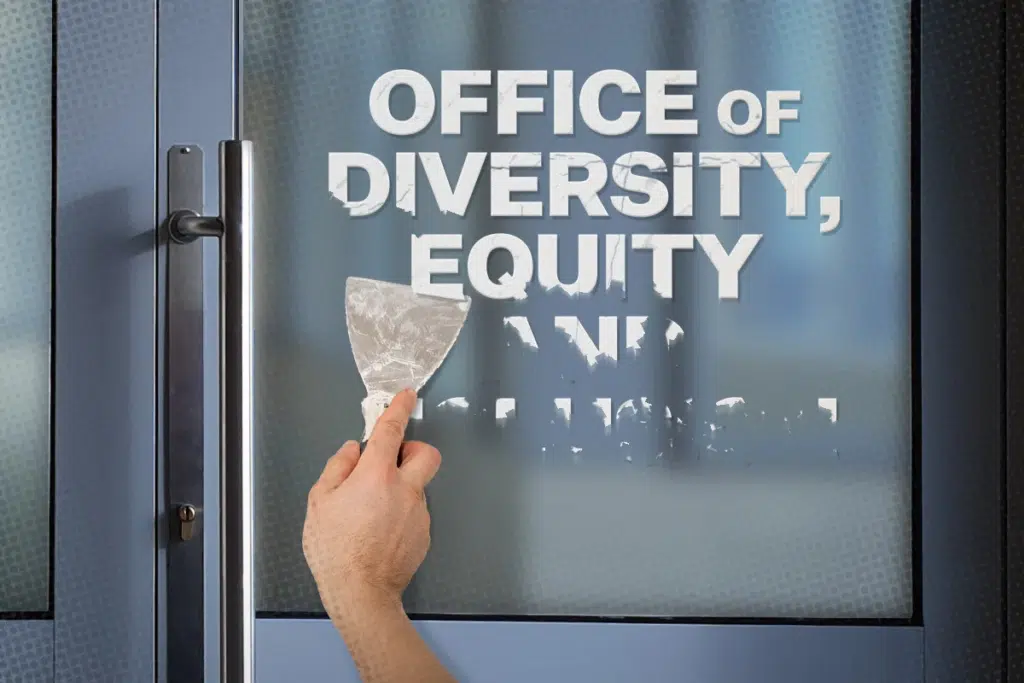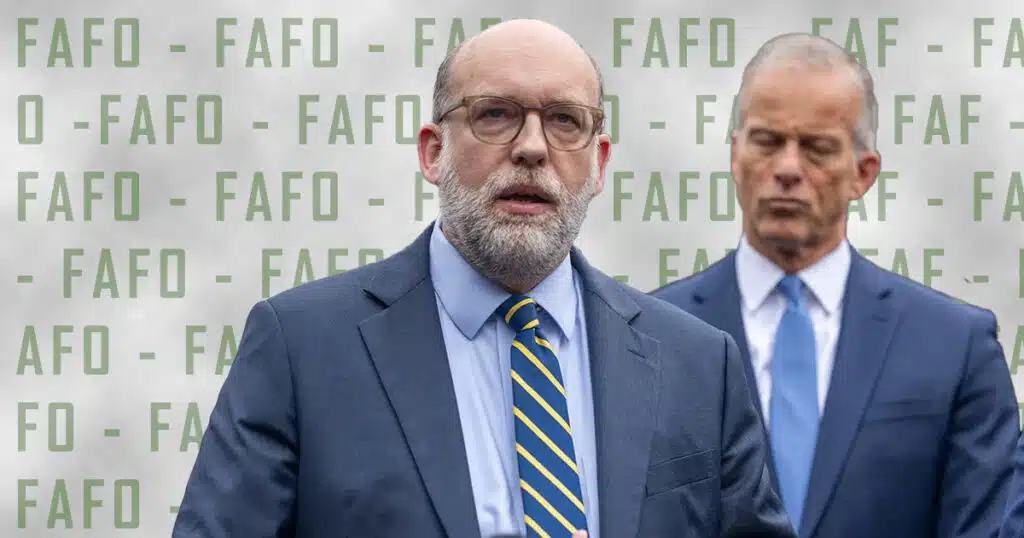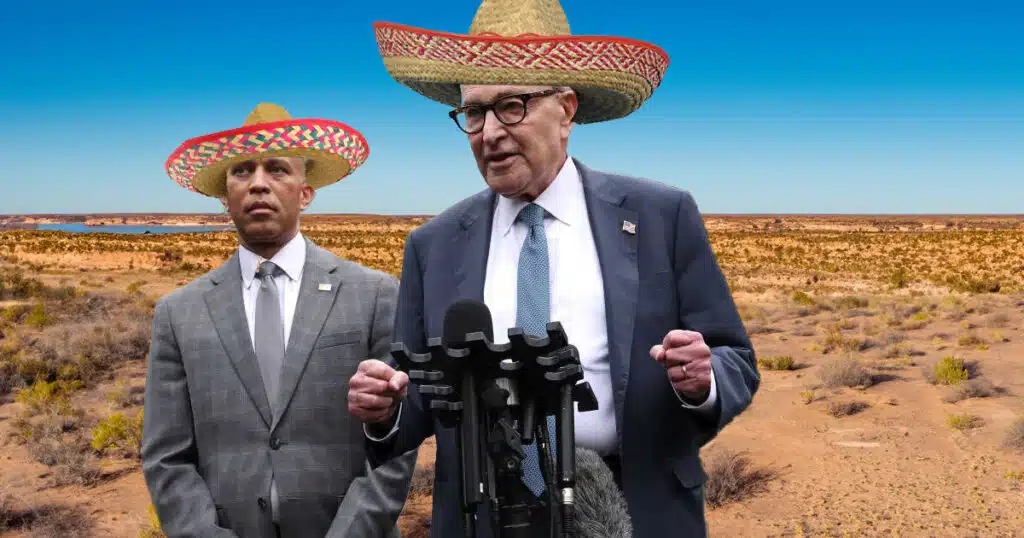
A “Bridge Too Far” At America’s Universities
Diversity, Equity, and Inclusion (DEI) is nothing more than a quota program. Across the nation, companies are waking up to this fact, and some are ditching the programs they had instituted after realizing that the results were poor.
The facts are that not only are the results poor, but they are also horribly unfair and dangerous. Unfortunately, not all industries and institutions have awakened from their DEI comas: the airline industry and, in far too many cases, the American education system continue to propagate this delusion.
One example of this wrong thinking exists at the University of Illinois Chicago (UIC). In September 2022, the school’s Department of Industrial Engineering made an outlandish commitment to hiring based on race and gender over merit, stating that from this point on, 50 percent of all faculty hires would be either women or minorities.
The school has obviously been blinded by wokeism. In their statement about the need for “culturally relevant pedagogy,” the department explained that “minoritized” professors “tend to have a greater sense of the human, social, and communal nature of teaching and learning.”
Take that, white professors. This school believes you lack “the human, social, and communal nature of teaching and learning.”
Using this misguided lie, the department is applying to UIC’s Bridge to Faculty program, which funds the recruitment and mentorship of postdoctoral scholars from “underrepresented” groups.
On The university’s Office Of Diversity, Equity, and Engagement web page, The Bridge to Faculty Program is described as:
Bridge to Faculty (B2F) is a recruitment program designed to attract underrepresented postdoctoral scholars with the goal of a direct transition to a tenure-track junior faculty position after two years. This recruitment initiative aims to attract and retain promising scholars to UIC as well as diversify our faculty, with particular emphasis on departments with low or no presence of faculty who are underrepresented in their field. B2F uses a cohort model, where postdoctoral scholars participate together in meetings and tailored workshops to prepare them to teach, establish a research program and, support their ability to pursue grants, and create productive mentor relationships.
Departments interested in hosting a B2F Scholar must complete an application detailing the rationale for their interest in participating in the program and must provide a plan for mentoring and supporting an incoming B2F Scholar, expectations for evaluating Scholar progress through the two-year postdoctoral period, and a plan for transitioning the Scholar into a faculty position after the postdoctoral period. Departments selected to participate in the program conduct competitive searches to select and hire B2F Scholars. Resources for the postdoctoral positions and the faculty hires that result are provided by UIC’s central administration.
B2F is funded by the Chancellor’s Office and administered through the Office of the Vice Chancellor for Diversity, Equity & Engagement. For more information, please contact Dr. Nadine Peacock, Associate Vice Chancellor for Equity & Belonging, and Mario Lucero, Director of Inclusion Initiatives, via the B2F email account [email protected].
Yes, the school actually has an Associate Vice Chancellor for Equity and belonging and a Director of Inclusion Initiatives. These are paid positions designed to specifically exclude merit for the deranged idea of supposed inclusion.
The web page also states that there are:
48 B2F Community (Campus Partners), 49 Total B2F Scholars, 31 of whom are already UIC professors, and more hires on the way! It also states that 14 New B2F Scholars started in Fall 2023.
The department wrote in its application that the money would help the engineering program hit its diversity targets and, by boosting the number of minority faculty, enable students” to change “oppressive systems, discriminatory practices, and eventually society as a whole.”
What oppressive systems? Let’s get this straight. The plan is to conduct discriminatory practices to end discrimination—leftist logic at its best.
The initiative proved successful: when the University of Illinois at Chicago (UIC) announced its fourth cohort of Bridge scholars in 2023, the Department of Industrial Engineering was one of ten departments selected to participate.
Among the other departments recognized was the History Department, which committed in its application to:
“Hire a Black or Native American scholar specializing in colonial Latin America, with a focus on the study of slavery or Indigenous peoples.”
The Department of Urban Planning and Policy stated its intention to hire:
“A scholar with expertise in environmental justice and environmental racism, who comes from a community of color.”
The issue here is that it is not only morally despicable to grant employment based on skin color or gender, it’s also flat-out illegal. Dan Morenoff, the executive director of the American Civil Rights Project, a conservative public interest law firm, said this about the university’s hiring.
“It’s illegal for employers to hire or refuse to hire anyone because of their race. UIC looks to be openly flouting its legal obligations.”
Although the Supreme Court prohibited race-based college admissions last year, Morenoff noted that discrimination in employment, particularly in faculty hiring, has been illegal since 1964.
Since 2020, nearly 40 departments have applied to the Bridge to Faculty program. Most of these applications, obtained through a public records request by the National Association of Scholars, explicitly state that the program’s funding will be used to hire minorities only. Written pledges that seem to violate federal law.
Now in its fifth year, UIC’s initiative is part of a variety of pipeline programs that are transforming faculty hiring practices across the country. These programs hire postdoctoral scholars and provide them with a fast track to tenure, effectively creating a bridge from postdoctoral positions to faculty roles.
Funding for postdoctoral positions usually originates from the university’s central administration. The administration invites applications from each department and allocates a limited number of grants. As a result, departments often compete to demonstrate their commitment to DEI and secure these funds. They highlight their diversity goals and provide examples of the measures they have taken to achieve them.
The UIC applications, which total over 400 pages, shed light on these competitions. They indicate that pipeline programs are advocating quotas that have been illegal for six decades. Additionally, these quotas and the pressure to secure funding to meet them seem to affect other diversity initiatives, including race-based tenure decisions and activist curricular offerings.
The result is a climate in which DEI is integrated into every level of university governance. In its application to the Bridges to Faculty program, UIC’s psychology department highlighted that it had made “DEI-related activities a significant factor in promotion and tenure decisions.”
Similarly, the communications department stated that the “entirety of its curriculum focuses on the inequalities generated and perpetuated through communication technologies.”
“Communication technology use has long been shaped by the canonical preferences of a hegemonically reinforced White masculinity,” the department wrote in its 2023 application. By incorporating the “lived experiences of a minoritized scholar,” the department “would be better poised to teach students how to develop ways around the dominant habitus.”
Many applications argue that faculty diversity is essential for teaching. As the Community Health Sciences Department stated in 2020, “Students need faculty who resemble them.”
The communications department stated that having a minoritized individual as a teacher or scholar is inherently educational for all students.
The computer science department noted that adding another BIPOC, female, or nonbinary faculty member would demonstrate to BIPOC, female, and nonbinary students that they can succeed in the field of computing.
Some applications contended that it would be unethical to recruit a diverse student body without also having a similarly diverse faculty. The History Department, which received the Bridge to Faculty award in 2022, stated that the absence of minority professors has made it “impossible, and perhaps even immoral, to recruit cohorts of underrepresented graduate students.” Meanwhile, the Department of Art History raised concerns about it being “ethically problematic” for white scholars to teach courses on “Black-Indigenous” art.
Not only does the university’s hiring policy exhibit racism against white professors, but the courses that are being taught are useless. The urban policy department stated that its postdoctoral fellow would teach courses on “climate change, environmental racism, and antiracism in planning.” Meanwhile, the Biomedical Engineering Department, which received funding through the program last year, committed to hiring a scholar who would “train the next generation of biomedical engineers in DEI principles.”
“Only one of our faculty is of Hispanic origin and none are from Black/African American or Native American communities. The Bridge to Faculty program could be an excellent opportunity for our department to address the identified lack of diversity in race, ethnicity, and gender amongst our tenure-track ranks as compared to the students we serve.
I’m sure this is not the only university conducting its hiring practices in this manner, UIC is only one example. However, they are brazenly exploiting the law. This needs to stop, and those in charge need to be fired. They are essentially teaching an entire generation who attend their school that the lie of white supremacy exists, and the laws don’t matter.
The left continues to thumb their nose at society while claiming that conservatives are fascists and promote tyranny. All the while openly displaying both. Since they won’t do it themselves, It’s time to MAKE them understand the error of their ways. Stopping this type of nonsense is a good start.



